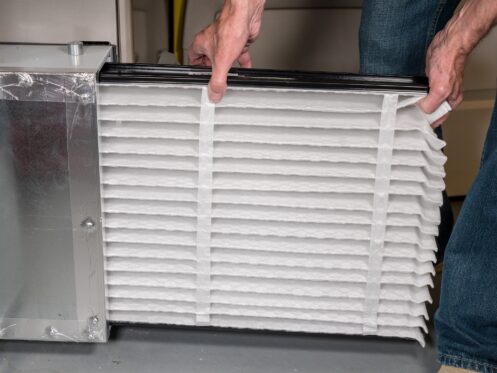Having proper air filtration in your home is important for protecting your HVAC system from potential damage and preserving your home’s air quality. Knowing which type of air filter to choose for your home isn’t always easy since there are so many different types and various options. Using the wrong filter can prevent your heating and air conditioning from working effectively or cause it to use more energy. Some types of filters will also make a bigger difference to the air quality in your home. That’s why we’ve created this guide to explain all you need to know about air filters to ensure you choose the right one for your home.
Make Sure You Know What Air Filter Ratings Mean
You’ve likely noticed MERV ratings before when shopping for an air filter, but it’s important that you actually grasp what these ratings refer to and what they mean. MERV stands for Minimum Efficiency Reporting Value and is the most common scale used to measure and rate how well air filters work. An air filter’s MERV rating is determined by testing it to see what percentage of various airborne particles the filter traps and how many particles just flow straight through it. Specifically, the test looks at how well the filter works at trapping both larger and much smaller airborne particles.
Most HVAC air filters are effective at trapping and filtering out larger particles like dust from the air as it passes through the filter. However, less efficient filters can basically only trap large particles and will allow most or all smaller particles to pass straight through. This includes things like pet dander, dust mites, mold spores, pollen and virtually all airborne chemicals.
The scale goes from MERV 1 (least efficient) to MERV 20 (most efficient). Standard residential HVAC air filters typically range from MERV 8 and 13. You generally don’t want to ever use anything lower since it would allow a large amount of dust and other particles to get inside your HVAC system. That would then would usually result in it needing more repairs. For instance, a MERV 4 filter traps less than 20% of larger particles and won’t filter out any smaller particles. Even a MERV 7 filter will allow around 50% of airborne dust and other particles to pass straight through. High-efficiency HEPA filters are well-known, but they are typically only used in small, portable devices or large, industrial settings that require extremely sanitary conditions like labs and hospitals.
You also don’t ever want to use a more efficient filter than your HVAC system was designed to handle. The higher a filter’s MERV rating is, the more force it takes to draw air through it. The fan or blower in most residential air filters simply isn’t powerful enough to draw sufficient air through a filter with a much higher MERV rating. How high you can go before the blower starts to massively struggle to draw air through the filter and into your HVAC system often depends largely on the size of your home. Larger homes have larger HVAC systems, which means they also have a more powerful blower.
Using a filter that is too efficient for your HVAC system will restrict the volume of airflow coming in. There will be more strain on the system when it runs, which can lead to increased repairs and a shorter lifespan. This is why it’s a good idea to discuss with an HVAC technician to see what filter will work best for your HVAC system the next time you have it serviced.
Choosing Between Disposable and Washable Air Filters
Deciding whether to buy disposable filters or a washable/reusable filter is mostly a matter of preference. Some washable filters are poor quality and not nearly efficient enough to protect an HVAC system from potential damage. Nonetheless, there are plenty of washable filters on the market that have just as high MERV ratings as disposable filters and work just as well.
The great part about disposable filters is that they don’t require any work. Once the filter gets dirty, slide it out of the slot and put a new filter in. The drawback is that the cost of disposable filters adds up over time. Depending on MERV rating, you’ll usually pay somewhere between $8 and $20 for a disposable filter or slightly less if you buy a bulk pack.
A decent disposable filter will normally cost you anywhere from $60 to $150. Nonetheless, it should last for at least five to 10 years. The only drawback is that you’ll need to fully wash the filter and let it completely dry whenever it gets too dirty. Unless you have two washable filters, you’ll also want to shut your HVAC system off when you need to wash the filter since you should never run it without a filter.
Comparing Standard Air Filters and Media Filters
If you’re looking for a higher level of filtration, one of the best options is to have an HVAC adapt your ductwork to accommodate a media filter. This type of filter is sometimes also referred to as an air cleaner and provides much better filtration, which means it will improve the air quality in your home. Standard air filters are only 1-inch thick while most media filters are 4 or 5 inches. The increased thickness means that a media filter contains much more material and has many more pleats. These factors increase the filter’s internal surface area to trap and hold many more particles than a standard filter before the pleats finally start getting full and the filter begins to clog.
Most media filters are rated between MERV 12 and 15 or 16. Despite being more efficient and having a higher rating, media filters aren’t nearly as restrictive as higher-efficiency standard filters. That means you won’t have to worry about a media filter negatively impacting airflow and making your HVAC system work less efficiently or heat and cool less effectively.
Another reason that people choose to install media filters is that they last much longer. While a standard 1-inch air filter usually needs to be replaced after 60 to 90 days, media filters typically last for six to 12 months. The longer lifespan is also why media filters can improve HVAC efficiency. Many people neglect to change a standard 1-inch air filter often enough, which results in the energy efficiency of their HVAC system continually decreasing.
For nearly 50 years, Christian Brothers Air Conditioning Plumbing Electrical has been providing expert home comfort services in Glendale and throughout the Valley of the Sun. Our technicians are ready to advise you on what type of filter to use or to help with all of your air conditioning and heating requirements. We specialize in installation, repair and maintenance as well as all residential plumbing, electrical and indoor air quality services. Whether you need to schedule an inspection, service call or consultation or just need help choosing the right air filter, contact us today.










